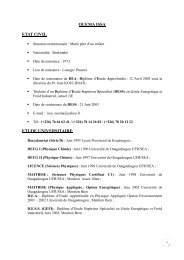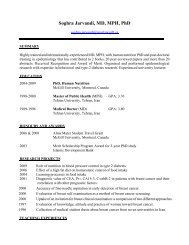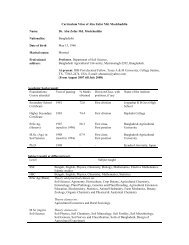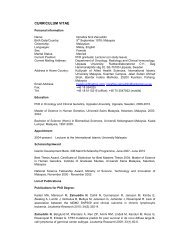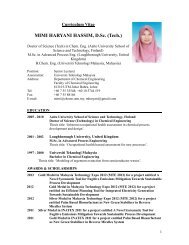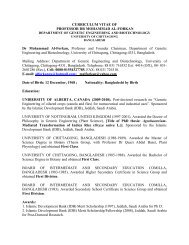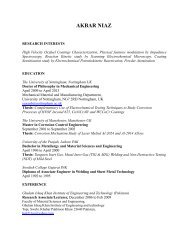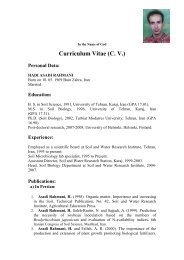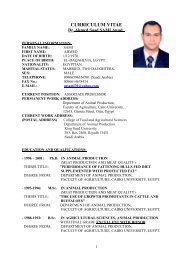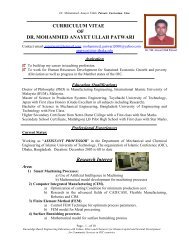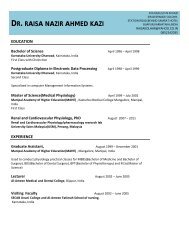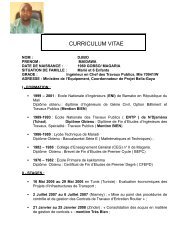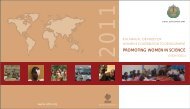Engineering: issues, challenges and opportunities for development ...
Engineering: issues, challenges and opportunities for development ...
Engineering: issues, challenges and opportunities for development ...
Create successful ePaper yourself
Turn your PDF publications into a flip-book with our unique Google optimized e-Paper software.
ENGINEERING: ISSUES CHALLENGES AND OPPORTUNITIES FOR DEVELOPMENTThe Africa Engineers ProtocolThe Africa Engineers Protocol of Underst<strong>and</strong>ing <strong>and</strong> Cooperationwas developed by the AEF to cover the essentialcomponents of what is seen as ‘sustainable engineering’,which is a prerequisite <strong>for</strong> sustainability. The AEF protocolcontains the following items:■■■■■■■Develop <strong>and</strong> uphold the AEF concepts aboutsustainable <strong>development</strong>.Communicate at a technical level amongst allengineering professionals, resident within <strong>and</strong> outsideAfrica.Develop <strong>and</strong> implement alliance <strong>and</strong> integrationmodels <strong>for</strong> AEF interaction <strong>and</strong> networking with othercontinental <strong>and</strong> international engineering <strong>and</strong> otherbuilt environment organizations.Promote <strong>and</strong> accept internationally accepted norms interms of conduct, integrity, ethics, engineering st<strong>and</strong>ards<strong>and</strong> care <strong>for</strong> our people <strong>and</strong> our environment.Develop <strong>and</strong> maintain acceptable <strong>and</strong> appropriateframeworks to accredit <strong>and</strong> recognize educationalqualifications <strong>and</strong> professional st<strong>and</strong>ards to facilitatereciprocity <strong>and</strong> equity.Encourage <strong>and</strong> facilitate ongoing learning <strong>and</strong>professional <strong>development</strong> <strong>for</strong> engineeringprofessionals.Set up <strong>and</strong> maintain an African electronic database <strong>for</strong>technical in<strong>for</strong>mation linked to the websites of the AEFsignatories <strong>and</strong> other partners of strategic importance<strong>and</strong> relevance.■■■■■Disseminate relevant published technical papers,articles <strong>and</strong> editorials.Exchange <strong>and</strong> provide access to technical journals <strong>and</strong>magazines <strong>for</strong> reference purposes.Arrange professional <strong>and</strong> technical networking<strong>opportunities</strong> <strong>and</strong> events within the influence sphereof participating organizations in cooperation with theother participants in AEF, <strong>and</strong> make use of the potentialcontribution <strong>and</strong> assistance of the African diasporaengineers.Set up, maintain <strong>and</strong> manage an events databaseconcerning annual programmes of events, includingthose relating to continuous professional <strong>development</strong>,<strong>for</strong> the purpose of <strong>for</strong>ward planning <strong>and</strong> coordination.Communicate, accept <strong>and</strong> implement best practicein terms of desirable <strong>and</strong> appropriate local <strong>and</strong>internationally recognized engineering st<strong>and</strong>ards,processes, procedures, methods or systems in relationto the delivery processes <strong>and</strong> the life cycle of products<strong>and</strong> assets.■st<strong>and</strong>ards, Facilitate the harmonization ofdocumentation,methods <strong>and</strong> procedures as appropriate.■■Promote the use of procurement as an instrument <strong>for</strong><strong>development</strong> <strong>and</strong> capacity-building.Promote <strong>and</strong> facilitate entry to <strong>and</strong> equality <strong>for</strong> alldemographic <strong>and</strong> gender groups in the engineeringprofession.■at all levels of decision-making in government <strong>and</strong> theprivate sector.Facilitate <strong>and</strong> promote networking amongst Africantertiary educational institutions involved in engineeringrelated education.■ Facilitate <strong>and</strong> promote appropriate education <strong>and</strong>training <strong>for</strong> engineering professionals dealing with the<strong>challenges</strong> of rural <strong>development</strong>.■Facilitate <strong>and</strong> offer public awareness programmesin order to enhance the visibility <strong>and</strong> recognition ofthe role of the engineering profession in African civilsociety.■ Promote <strong>and</strong> support pertinent science <strong>and</strong> technologypolicy including the extension of research <strong>and</strong><strong>development</strong> initiatives by governments in Africa.■■■Develop <strong>and</strong> offer capacity-building programmes inorder to develop a pool of knowledgeable decisionmakers,clients <strong>and</strong> users of engineering infrastructure<strong>and</strong> services.Invite <strong>and</strong> facilitate government <strong>and</strong> private sectorparticipation in engineering practice <strong>and</strong> relatedmatters.Develop, promote, facilitate <strong>and</strong> lobby <strong>for</strong> theacceptance of best practice policies relating to <strong>for</strong>eigninvestment <strong>and</strong> donor involvement <strong>and</strong> influence inAfrica.■ Promote appropriate curricula at schools to prepare <strong>and</strong>enable learners to enter into the field of engineering.■Exchange in<strong>for</strong>mation <strong>and</strong> sharing of experiencesregarding engineering practice.■Provide a plat<strong>for</strong>m <strong>for</strong> influential African engineeringprofessionals who can influence best policy practices■Develop <strong>and</strong> provide outreach <strong>and</strong> career guidanceprogrammes <strong>for</strong> all school learners.4.3.12 International Federationof <strong>Engineering</strong> EducationSocieties (IFEES)Hans J. Hoyer with Lueny Morell, ClaudioBorri, Sarah Rajala, Seeram Ramakrishna,Xavier Fouger, Bruno Laporte, José CarlosQuadrado, Maria Larrondo Petrie <strong>and</strong>Duncan FraserIntroduction<strong>Engineering</strong> <strong>and</strong> technology play a key role in globalization asboth developed <strong>and</strong> developing countries design <strong>and</strong> implementeffective <strong>and</strong> efficient strategies that advance theireconomies <strong>and</strong> social <strong>development</strong>. Science <strong>and</strong> engineeringeducation needs to be continuously evolving in order to assistall countries to reduce poverty, boost socio- economic <strong>development</strong><strong>and</strong> make the right decisions <strong>for</strong> sustainable <strong>and</strong> environmentallycompatible <strong>development</strong>.A global approach is needed to effectively innovate in engineeringeducation. The world needs to establish effectiveengineering education processes of high quality to assure aglobal supply of well-prepared engineering graduates; engineerswho can act locally but think globally. It is imperativethat technical know-how be supplemented with professionalskills to develop a generation of ‘adaptive engineering leaders’capable of addressing the multiple <strong>challenges</strong> of an everchangingworld – these are the engineering professionals thata globalized world needs.The role of engineering education in growing knowledgebasedeconomiesKnowledge <strong>and</strong> innovation have always played a key role in<strong>development</strong>. Fifty years ago, competitiveness <strong>and</strong> growth152



